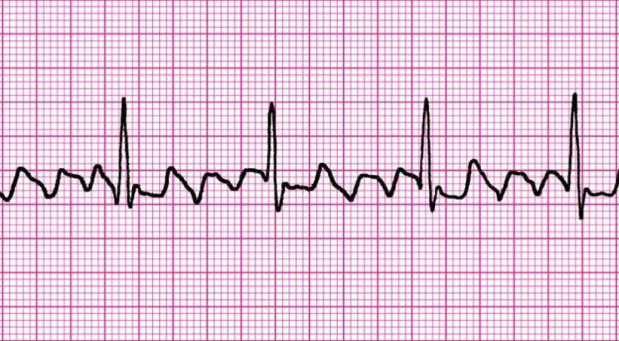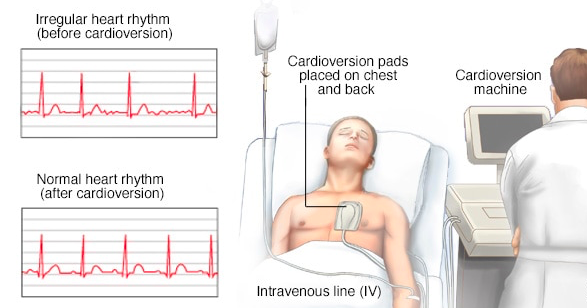A few days before our annual family weekend in July, I noticed that I got out of breath quicker than usual, and also felt that my heart was beating much faster than usual. I tried to ignore it for a while, but of course that only works for a very short while, when you can keep feeling your heart pounding in your chest. I wasn’t sure if I just imagined it, or if I could actually feel my heart beating stronger and faster than before. I thought I could even see it, but that might have been my mind playing tricks on me.
I was constantly feeling like I had too much coffee, and deliberately avoided anything containing caffeine.

The castle in Schwerin. Source: MV-Schloesser
The family weekend included a 10K run in my hometown Schwerin, Germany. Quite a few of us signed up for the Fünf Seen Lauf (5 Lakes Run), including myself. On my way to the event, I already felt dizzy, but blamed it on the excitement and being nervous. My mom and I decided to take it very easy and run very slowly – possibly only walk the 10K.

10km route. Source: Fuenf Seen Lauf
However, after running for around 200m I started feeling super dizzy again and apparently my skin turned very blue. I went to the side and laid on the floor. Two helpful and friendly spectators who had a medical background came to my rescue straight away, and the ambulance was there within minutes. I was brought to the ambulance car and taken to the hospital immediately. Sirens and crossing red lights included. The doctors started doing ECGs straight away, gave me additional oxygen and maybe an IV. I’m not so sure about this anymore. I just remember that the ambulance team was extremely caring, calming and professional.

After around 10min drive we arrived at the local hospital where I was taken to the emergency room and more tests were done. Anything from x-rays, ECGs, blood tests and an IV. As it was the weekend, there are fewer people working at the hospital and the wait is much longer than usual, which obviously is not great. Looking at the ECG, doctors determined that I had atrial flutters.

A “saw tooth”ECG of Atrial Flutter. Source: The Student Physiologist
Atrial flutter is an arrhythmia, an abnormal heart rhythm, slightly different to atrial fibrillation. Essentially the atriums of the heart are beating too fast, which results in atrial muscle contractions that are faster than and out of sync with the ventricles. The pulse is way too high, which means that the blood is not pumped properly through the body. Important organs like the brain could fail, and congestive heart failure, heart attack, and stroke all can result.
Atrial fibrillations in contrast to that is marked by a very irregular and chaotic heartbeat.

ECG Atrial Fibrillations. Source: Heart Health
To treat atrial flutters an electrical cardioversion is necessary, which will reset the heartbeat. Thereby an electrical shock is delivered to your heart through paddles or patches placed on your chest. The shock stops your heart’s electrical activity for a short moment and will hopefully set the heart beat back to its normal rhythm, the sinus rhythm.

Electrical Cardioversion. Source: Mayo Clinic
Before a cardioversion can be done, a Transesophageal Echo (TEE) is required, to check for any blood clots. This means an echo is done via your esophagus, which is rather unpleasant, but doable. Moreover your mouth will be sprayed with a very cold spray, that numbs the whole mouth and throat area. As with these kind of procedures there is always the risk of scratching anything internally, the INR level has to be very low, before a TEE can be done. From experience, the anticoagulation medicine I’m taking is taking its sweet time to get out of my body. So around 6 blood draws, 5 days and 2 fasting mornings later, my blood levels were finally good enough to do the TEE and potentially a cardioversion.

Me, doing a 24h holter ECG, and a permanent one, which was directly linked to a screen the nurses could check.
I’m not going to lie, the TEE is nothing I’m eager to do again any time soon, but it is tolerable. The feeling is uncomfortable, but the whole procedure doesn’t take more than a few minutes. The cardioversion happens very quickly, and you don’t feel a thing, as you are put in a deep sleep.
I could feel the improvement straight away, as the heart was finally beating normal again. I only felt a bit drowsy and sleepy from the anaesthetics.
The next day I was discharged from hospital and could finally go on the holiday I had originally planned with my sister. Even though it was a much calmer and shorter holiday now.

Exploring local sights on holiday – Mecklenburgische Bäderbahn Molli

On holiday near Heiligendamm, Germany
There were no obvious signs what may have caused the atrial flutters, but it is something especially heart patients are very prone to.
My doctors always recommended to exercise, all of course within limits. I have slowly started working out again, but will put the running on hold for a while. Most of the time I’m wearing a watch recording my heart beat, to check it during the day, and so far exercising has never caused the pulse to go up again, so I’m hopeful. I would be quite upset if I have to quit running, but want to be careful and take it very slow. Therefore I will focus on swimming, cycling, yoga and speed walking over the summer.
I’m now supposed to take beta blocker Bisoprolol daily, but honestly am not keen on it at all. It is making me tired and gives me a headache. Therefore I have dialled it down to every other day, and I’m feeling much better already. However, I do want to discuss this at my next check-up again, as I’m not a fan of taking medication. If there are natural substitutes I would much more prefer those.

Source: UK Meds
What impressed me the most throughout this experience was, that I could feel the event happening, but didn’t know what was going on. If this was going to happen again, I would probably get it checked sooner, but because I was travelling I had put it on hold for a few days and hoped it would go away by itself.
In my mind, people living with a medical condition are becoming very skilled to listen to their body, it’s just a matter of listening to it and acting accordingly.

That’s sounds terrifying, I’m glad your ok and got to go on your holiday still.
Your right, people do know their own body more than anyone else but thank goodness for doctors and other medical professionals.
LikeLike